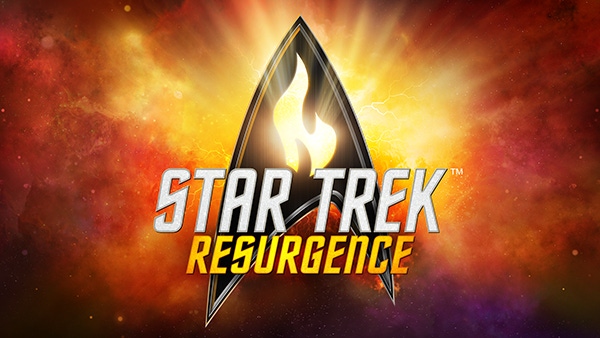Trending
Opinion: How will Project 2025 impact game developers?
The Heritage Foundation's manifesto for the possible next administration could do great harm to many, including large portions of the game development community.
Beyond the rim of star-light, Dramatic Labs emerges.

Last night's Game Awards included a slew of new game reveals, but some of them came with studio launches as well. One of those companies was Dramatic Labs, a team of all-remote developers working on Star Trek: Resurgence.
It's the first narrative adventure Star Trek game that we've seen in a long time. Set in the era following the movies featuring the cast of Star Trek: The Next Generation, Resurgence is a choice-driven third-person adventure game similar to Life is Strange or the other narrative adventures Telltale Games was known for.
That's because many folks at Dramatic Labs are Telltale Games veterans, including Cinematic Director Kent Mudle and lead writer Dan Martin. Mudle and Martin told Game Developer that the team at Dramatic Labs specifically assembled to bring Resurgence to life, and that the team's experience at Telltale helped convince Viacom CBS that they'd be good creative partners on a Star Trek game.
Here's our full Q&A with Mudle and Martin, where we discuss what it takes to make a game set in the legendary TV franchise, and how the team wants their new studio be a good workplace for years to come.
A big-budget Star Trek game is so exciting! Star Trek is a story that people have deep personal connections to, and sometimes those deep personal connections can lead to conflicting directions in adapting/internalizing Star Trek.
What’s your vision for working in this world, and what do you think you’re doing right to capture that Star Trek feel?
Martin: I think it starts with bringing our own personal connections to Star Trek. I remember watching Star Trek: IV on TV and not being entirely sure that they didn’t actually have a cloaked Bird of Prey set down in Golden Gate Park during filming. I watched The Next Generation at 7pm on Saturdays in first-run syndication on a local UHF channel.
One of my first jobs in Hollywood was on the Paramount lot and I got to stand on the very stages where the shows were shot. I was thrilled to reunite with Captain Picard and other old friends when they returned on Paramount+. And I’m anxiously awaiting the upcoming Strange New Worlds, to see new adventures from the crew of the Enterprise in the 23rd Century.
Mudle: For Star Trek: Resurgence, we’ve chosen a specific time period – right after the feature films of the Star Trek: The Next Generation era – that provides a lot of signposts for the look and the feel, but we hope to bring in the best of all the various incarnations of Star Trek to our game.
Star Trek is a series that’s been mythologized as pushing the boundaries for what’s considered or mainstream in society (Uhura and Kirk’s kiss in The Original Series, gay and nonbinary characters featured in Discovery, etc.) Does the team have any ambitions of contributing to that tradition of Star Trek?
Martin: The crew of the U.S.S. Resolute is a diverse one. That said, we are telling a brisk adventure story, so the relationships that we’re focusing on are the types of camaraderie found when people with a shared mission are put in extraordinary circumstances, the challenges of leading people with divergent viewpoints, and deciding what matters to you – the player – when there is no “right” answer.
Something I’ve loved about Star Trek as a child is watching the show introduce characters from its “villain” species as heroic, neutral, or morally complicated individuals as time goes on. (Klingons being the best example). Is this part of the team’s goal at all?
Martin: When dealing with alien species, perhaps “humanize” isn’t the right term to use… but we certainly want to show developed, well-rounded characters as representatives of their respective cultures. Our goal is always to challenge the player with tough choices, and creating complex relationships, even with the “villains” helps us do just that.
Mudle: Not to mention, the best villains see themselves as the heroes of their own story!
It’s cool that the team is launching an all-remote studio! Are there any challenges with setting it up that the team has been dealing with?
Martin: Putting together a new production or starting a company is always challenging. But one of the many benefits of a significant portion of the team having worked together on a lot of games already is that we have a shared understanding of how to put this game together.
Mudle: We know what needs to be done, and have a shorthand of communication already in place. We also have team members placed all over the country and work with outsourcing partners all over the globe, so in a way, you might say that we couldn’t have built this team any other way BUT fully remote.
With every new studio announce, we’ve been reflecting on the recent news about companies like Activision Blizzard and Ubisoft, and how abusive workplaces can take root. What do you think your team is doing correctly from the jump in terms of making sure your workplace is respectful, safe, and able to recruit developers from a diverse array of backgrounds?
Mudle: It’s very important to Dramatic Labs that we build an inclusive work environment for everyone involved. We want to enable people to do their best work, and that happens when they feel heard and respected, and they like what they’re making. And while we can always do better, our goal is to bring in more diverse voices to our team as we continue to grow.
To that end, we encourage any and all applicants to take a look at the jobs page on our website and see if they’d be a fit for one of the roles we’re looking to fill.
You May Also Like